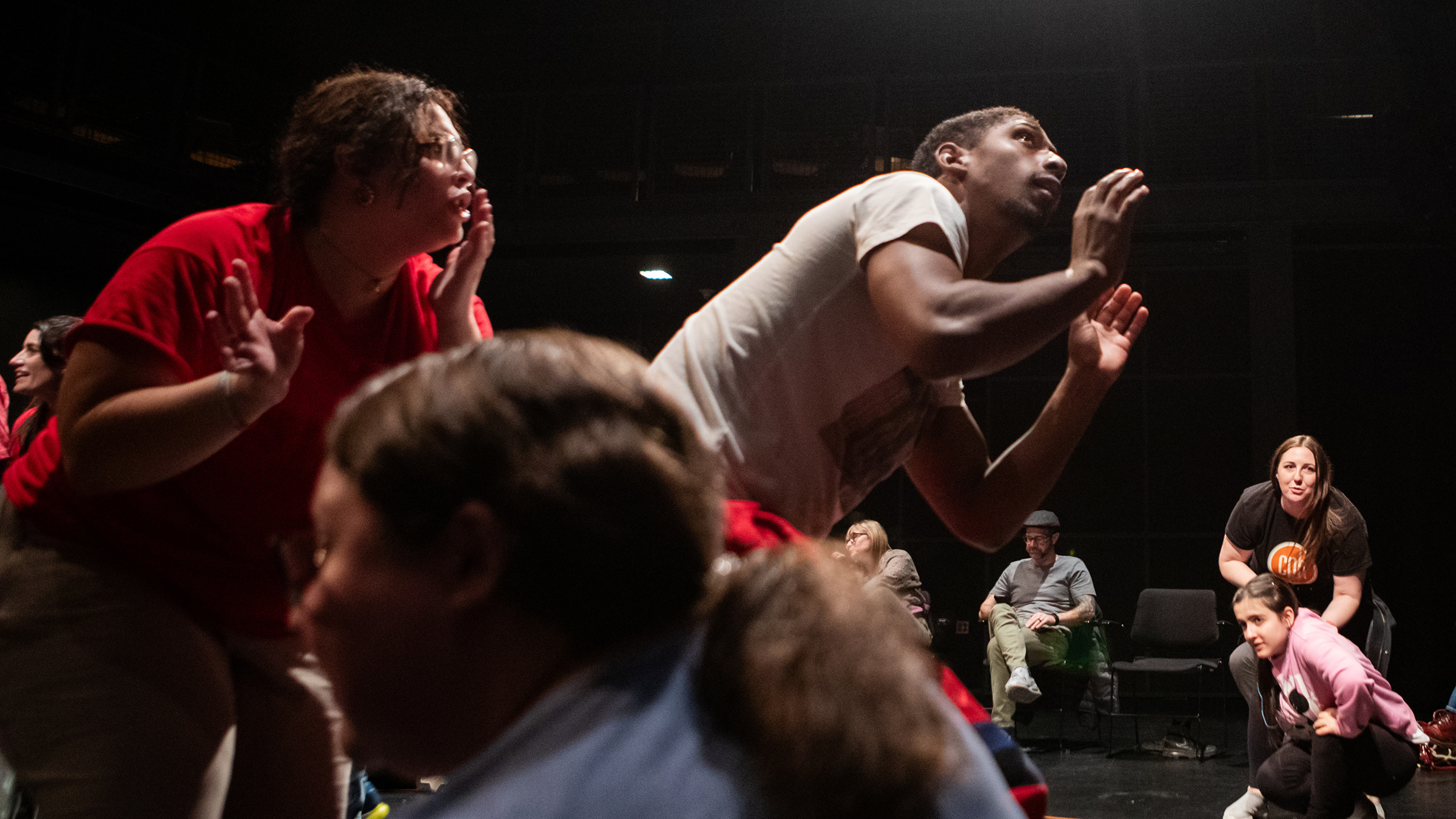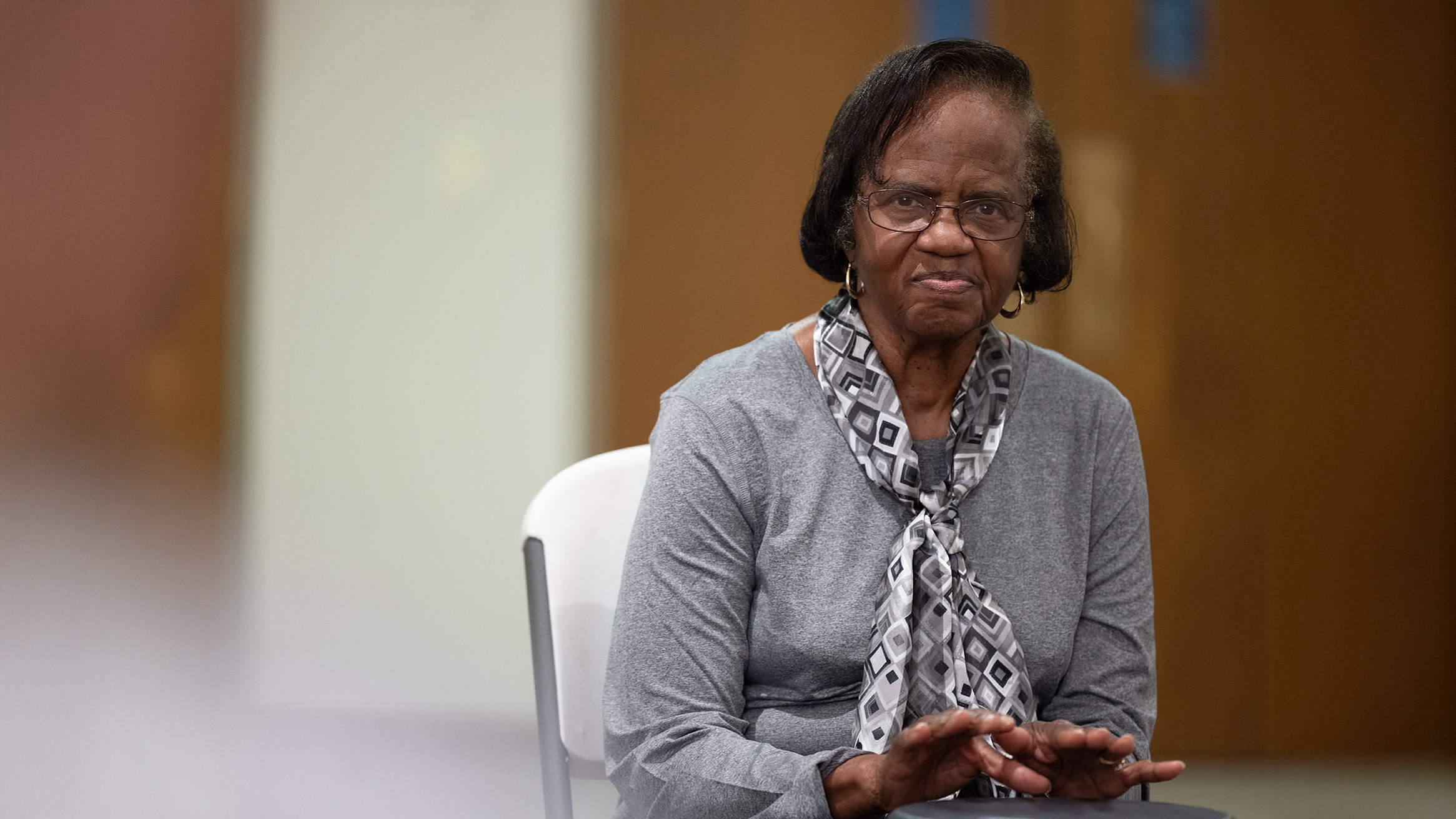Using Shakespeare to unlock blocks in children with autism
Shakespeare and Autism: Where those on the spectrum discover community and communication
Around the circle, children with autism and Ohio State students tap their hearts to a beat, singing, He-llo~, He-llo~, He-llo~.
Names are incorporated: He-llo~ Matthew… He-llo~ Malik.
And finally: He-llo~ everyone~, He-llo~ everyone~, He-ee-llo~ everyone~, He-lloooo.
It’s how every Shakespeare and Autism workshop begins, with “heartbeat hellos”. Research shows hearing your name sung spikes activity in the brain, releasing endorphins. It also helps those with autism transition to a new activity.
The Shakespeare and Autism Project is a civic engagement class and workshop at Ohio State based on the Hunter Heartbeat Method, a series of Shakespeare-inspired drama games that engage children on the autism spectrum in a play-based atmosphere.
Today’s workshop is parent’s day on the top floor of Ohio State’s Theatre, Film and Media Arts building, where Matthew Rivers Morgan sits comfortably, smiling, flashing a big thumbs-up to his mom, Stefanie Rivers. His brother Malik is a few people down, tapping to the rhythm as well.
Matthew, 21, and Malik, 17, are on the spectrum and participating in the final Shakespeare and Autism workshop of the semester. It’s bittersweet for the participants who won’t be back until the workshops begin next year, but for an hour on this afternoon, it’s pure joy.
Stefanie returns Matthew’s thumbs-up, smiles and giggles. “Matthew loves an audience.” She cocks an eyebrow, smirks and laughs. “Malik’s my strong, silent type.”
Still, Malik, typically standoffish, is eager to jump up and get in the circle when a volunteer is requested. After his performance in a game based on Pericles, he receives a thunderous round of applause.
“I love seeing them out there getting accolades, having people tell them how wonderful they are, making them feel special,” Stefanie said. “It’s the environment I try to create at home.
“The world is not made for special-needs people, they are not always able to show their personalities. Here they can. This environment allows them to shine and be the wonderful young men I see every day.”
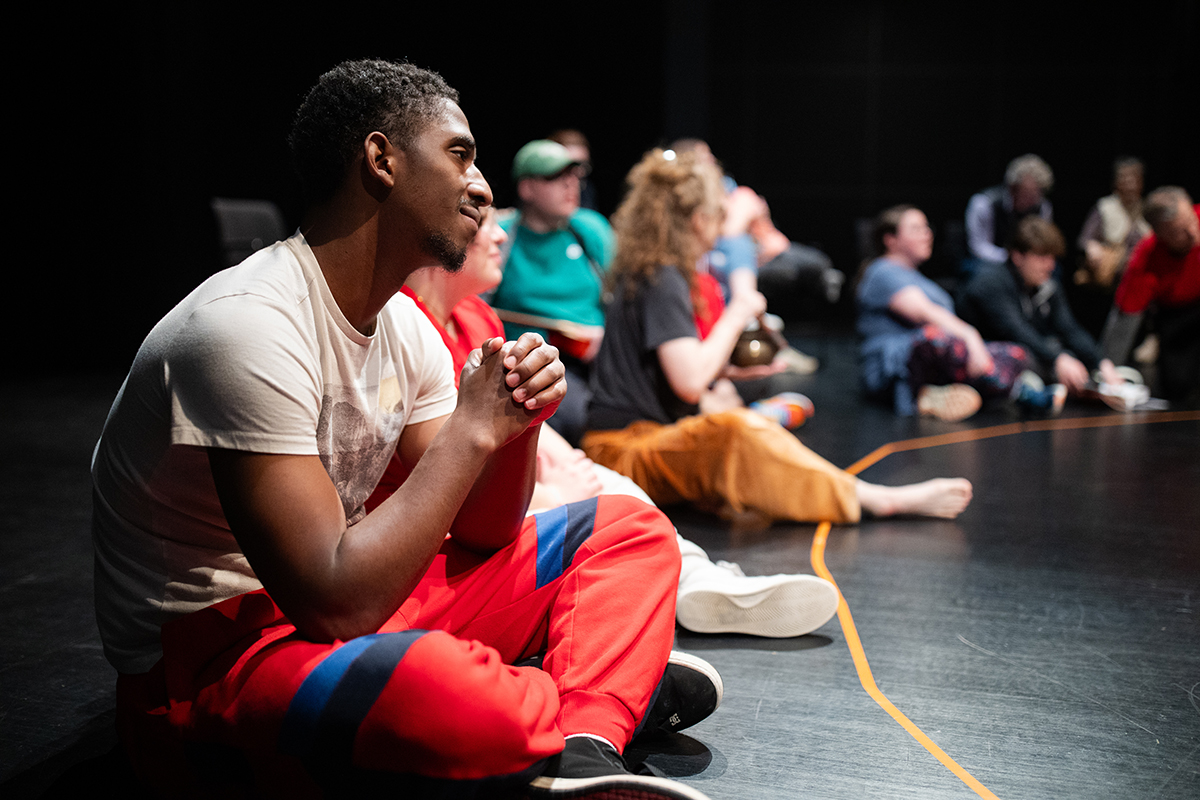
The process, the science
Stefanie is a special needs school psychologist with Columbus City Schools. She’s also a mother to two biological children, three foster children and four adopted children — three of whom are on the spectrum and have participated in Shakespeare and Autism.
Kevin McClatchy is the director of the Shakespeare and Autism project and Ohio State’s Artist Laureate for 2024-25. McClatchy is an associate professor in the Department of Theatre, Film and Media Arts, overseeing Ohio State’s acting curriculum.
An accomplished stage and screen actor, McClatchy helped build the Shakespeare and Autism Project as a graduate student when it began with a pilot study in 2011.
Since then, it’s grown into a civic engagement class in which students — “teaching artists” — and McClatchy lead the play-based workshops around Ohio to help children on the autism spectrum break through communication.
Through the Shakespeare and Autism Project, McClatchy has engaged over 400 children in Athens, Allen, Cuyahoga, Franklin, Licking and Marion counties, and trained over 100 students, theater professionals and educators in the Hunter Heartbeat Method.
While it is literally fun and games, according to McClatchy, each game performance has unspoken goals nestled within, such as improving eye contact, spatial awareness or turn-taking, among addressing other socialization challenges for children with autism.
- Challenges: Children with autism struggle with social skills such as eye contact, spatial awareness, turn-taking and language, among facing other cognitive, social and emotional challenges.
- Study: A two-year study conducted by Ohio State’s Nisonger Center found significant improvement among Shakespeare and Autism Project participants in overall adaptive skills, social and interpersonal skills, friendship making, use of expressive language and comprehending facial expressions.
“We don’t say, today we’re going to work on eye contact,” he said. “The only agenda is to have fun. But embedded in the games are opportunities to investigate self-expression and the core features of autism using language, movement, and communicative skills.”
For instance, following the heartbeat hellos, they play “throw the face.” McClatchy may make a happy face and throw it to Matthew, who does his own before throwing it to Malik. It helps with facial expression recognition, a struggle for those with autism.
Or during Matthew’s favorite game from The Tempest, when Miranda and Ferdinand fall in love at first sight. Matthew and a teaching assistant act out the scene, circling each other before noticing their partner, then issuing a visual cue of index fingers and thumbs circling their eyes. They cry out, “dooyyyiiiing” like a cartoon character seeing something amazing for the first time, then proclaiming, “O, you wonder!”
“They’re looking at each other in the eyes and they’re very excited, it’s reinforcing eye contact and making it this very rewarding thing,” said Marc Tassé, director of the Nisonger Center, Ohio State’s research and patient care facility that develops programs for people with neurodevelopmental disabilities such as autism.
Tassé helped conduct the original two-year study on the efficacy of Shakespeare and Autism beginning in 2011, before the program became a regular class at Ohio State. While Tassé admits he was skeptical at first, the study found the workshops helped improve many communication and socialization challenges for those with autism.
The science is one thing. It’s another to live with the results.
“It’s definitely helped Malik get comfortable around people,” Stefanie said. “Now he’ll go up to someone and ask what their name is, where they go to school. He wasn’t doing that before and it’s because of this.
“Matthew’s always been very talkative, never meets a stranger, but being in this has allowed him to be a leader.”
McClatchy calls that praise humbling and gratifying. But equally as important as the game structures is the joy-filled environment he and his students create.
“Shakespeare and Autism has no other function than celebrating each other,” he said. “How would you feel if you went into a space each week where you were met purely for who you are, a place where you’re continually celebrated and encouraged? That would feed you and sustain you. We simply create an opportunity where children can soar.”
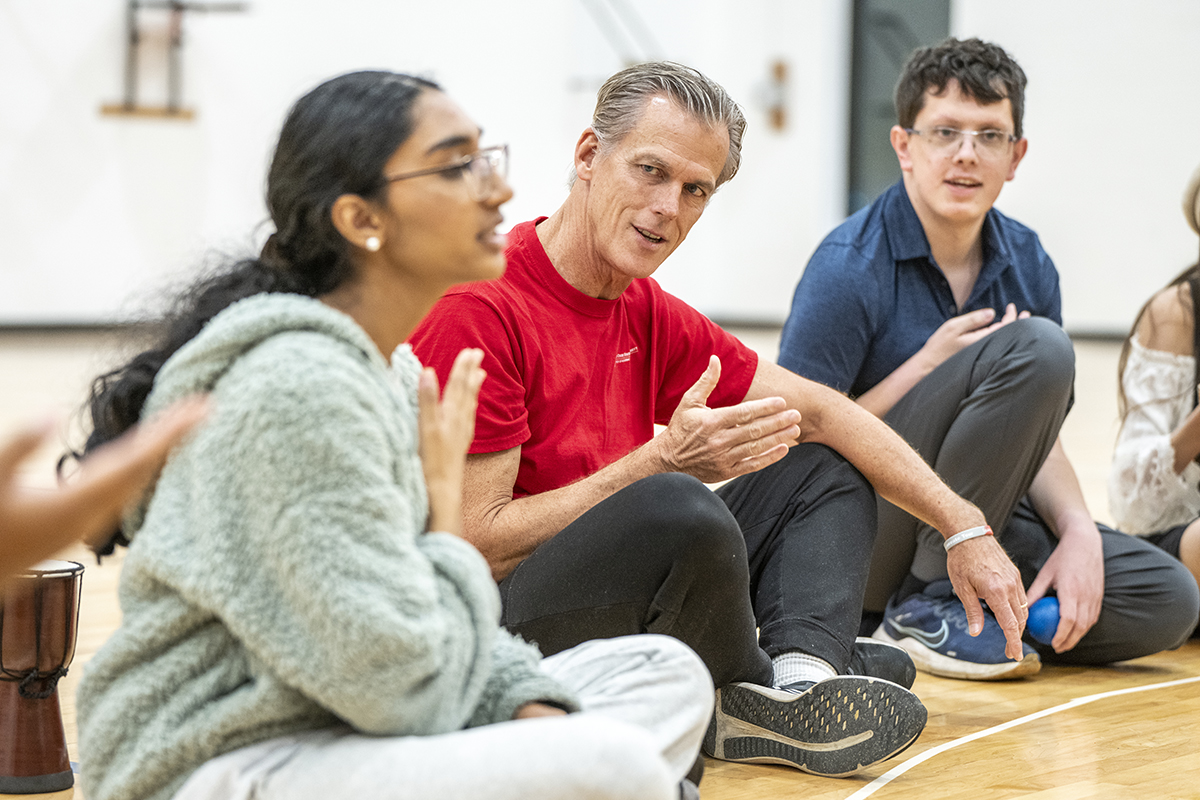
Around Ohio
Inside the Ohio State Marion gymnasium, Avah Pendleton, a 9-year-old third grader, is playing the role of Prospero, the powerful wizard from The Tempest. By flashing her hands, she shoots painful cramps into a teaching assistant. Later, she’s casting a hypnotic trance.
It’s Pendleton’s first-ever Shakespeare and Autism workshop, and by the end, she’s all smiles, throwing a ball around with the teaching artists. It’s quite the transformation from 90 minutes prior when McClatchy was told her social anxiety would keep her watching from the sidelines.
“I thought, we’ll see,” McClatchy said, smiling.
As Ohio State’s Artist Laureate, McClatchy took Shakespeare and Autism on the road this past fall, conducting training and workshops in Athens, Cleveland, Licking County, Lima and Marion.
Some of those who took the training included students at the regional campuses, like Megan Krummrey, a second-year student at Marion double-majoring in psychology and molecular genetics.
“I would love to continue having something like this in Marion and watch it grow, there’s a real need for it,” she said. “I’m grateful I was able to be a part of it, I learned a lot about applying techniques to those on the spectrum. It was an incredible experience.”
The goal of the tour was to introduce the workshops and allow local champions to build them in their communities. McClatchy says it’s starting to happen in many of the areas his team visited.
“It was a fantastic success,” he said. “You’re watching people change in real time and we’ve found it resonates and has legs.”
In Licking County, Kandee Engle — the president of the Southwest Licking School Board — took the volunteer training to participate in the workshop with her daughter Skyler.
“I wasn’t sure whether or not she would actually participate,” Engle said. “But when we got started, she really bought into it. She was singing, she even took the lead on some of the games. I do think it works.”
One of the important aspects of Shakespeare and Autism is, in fact, the people. You don’t have to be a Shakespearean performer or an autism expert to have an impact during the workshops, according to McClatchy. After all, he wasn’t.
“I was terrified when I first started doing this,” he said. “I was the walking, talking epitome of impostor syndrome. But when we rely on empathy and being fully present and meeting the children where they are, that primes the soil for magical things to happen.”
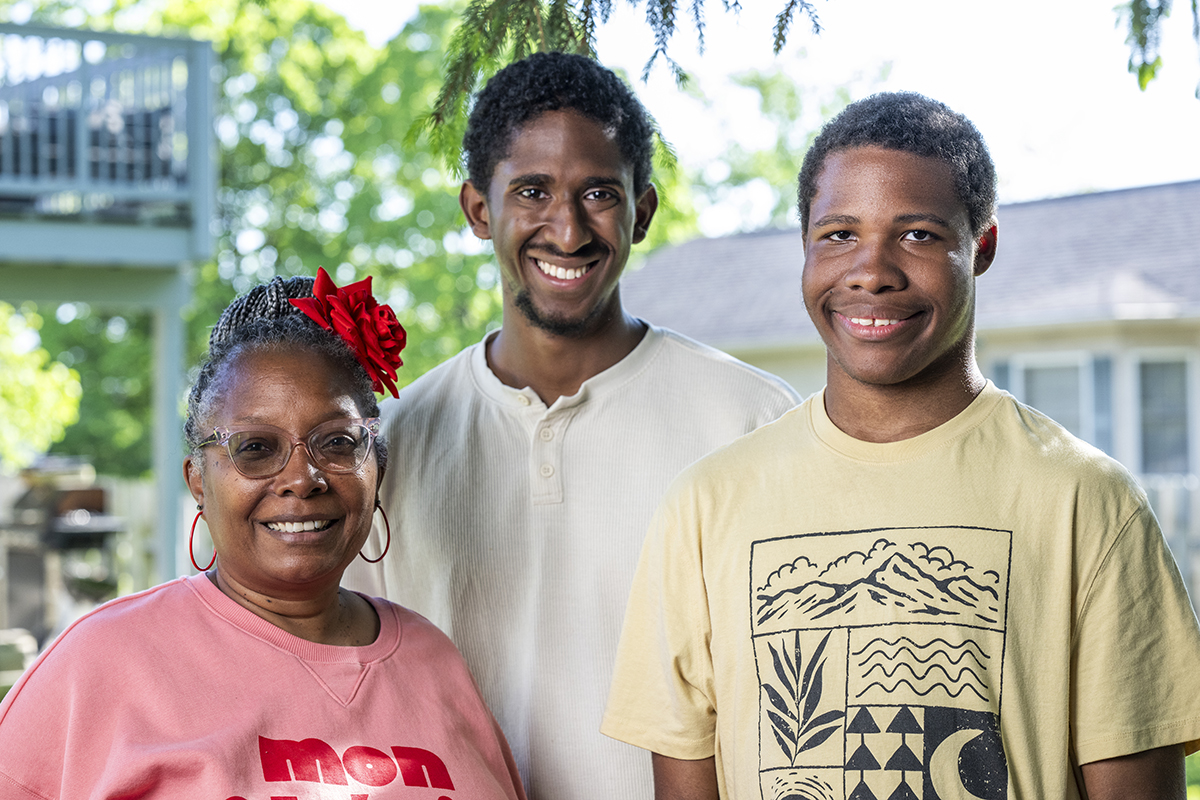
Acceptance and community
Malik closes his eyes and steps into the circle as Natasha Haward, an associate artist and performer from the Flute Theatre in England, sings his name.
Malik steps toward her and she dashes away, singing his name again. Over and over, he steps toward her but at the last second, she dances away until finally she stops and their hands touch. The entire circle begins to sing his name, and Haward leads him around to each person, who all reach out and touch his hands one at a time.
“I’m surprised he’s letting them touch him,” Stefanie whispers.
It’s April and the Artist Laureate tour is ending with a performance of Pericles at the Wexner Center for the Arts. Families who participated from around the state have shown up in droves. Parents watch their children participate with performers from Ohio State and the Flute Theater, including Kelly Hunter.
Stefanie brought three of her sons to the event thinking it was just to watch a performance. Instead, the boys were asked to join in. It was a welcome sight.
“When you have a disability, your life is very isolated,” Stefanie said. “I’ve lived in this world a long time. People want to be P.C. [politically correct] and say they accept people’s differences, but that doesn’t always happen. Most families with a special-needs person don’t have many interactions with other families. This environment creates that.
“My boys need people not to be afraid of them. That's what I appreciate about Kevin and what he's doing, teaching students to interact with my boys like you would anybody else.”
“But also, this is the only place my boys have a creative setting. Who would think Malik, who has limited language, would be reciting Shakespeare? It’s unheard of. But he can tell you lines from Shakespeare’s plays. They’re doing things that are not expected for people who have disabilities and it’s working. I’ve been impressed, very impressed.”
What’s equally important to Stefanie is the engagement with Ohio State students. She believes those interactions with children who have autism will help develop empathy and understanding among the students, who may never have met someone with special needs prior to the class.
“My boys need people to not be afraid of them,” she said. “That’s what I appreciate about Kevin and what he’s doing, teaching students to interact with my boys like you would anybody else.”
In fact, one of the first lessons students learn before the workshops begin is that while those with autism may not seem to want to engage, they crave friendship and fun like any other child.
“One of the stereotypes of autistic individuals is that they are a blank slate, they have no emotion or inner life,” McClatchy said. “Nothing could be further from the truth. Every autistic individual has a vivid, incredibly imaginative life. They just find it challenging to express that. So, we craft opportunities for them to do that in a play-based atmosphere.”
Angelina Steshenko was a teaching artist in the program until she taught the class this past spring. As she pursues a career in acting or teaching, the workshops have become so meaningful to her that she’ll replicate them in communities she travels to.
“These kids bring out the best in you,” she said. “Seeing them open up, do something they’ve never done before, have a great time, it will always fill your cup. Saying goodbye to these kids each semester is so hard.”
As the event wraps up, the workshop finishes with everyone singing a heartfelt goodbye.
Goodbye, Matthew, and goodbye Malik.
Applause. Smiles. Hugs.
The performances resume next winter. It’s not easy for her boys to say goodbye, according to Stefanie. After all, these are their friends.
“One of the things I struggle with is these boys generally don’t have a core friend group outside of my house,” Stefanie said. “I want my boys to have the same opportunities everyone else has, I want them to have the best life possible.
“When we come back to Shakespeare and Autism each week, that’s their friend group. People here are interested in them, they care about them. That’s meaningful.”
